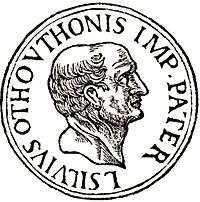Lucius Salvius Otho
Lucius Salvius Otho was father of the Roman emperor Otho, he was born of a distinguished and well-connected family on his mother's side. His close friendship with Tiberius, and physical similarity to him, led to rumours that he was that emperor's son.

Biography
Early life
Otho was the son of a Marcus Salvius Otho (who had been raised in empress Livia's home) and a woman who's name is unknown, although she is described to have been well connected. His paternal grandfather was an Etruscan.[1] None the less Otho was widely assumed to be emperor Tiberius illegitimate son due to the excessive affection Tiberius bestowed on him as well as a strong physical resemblance.[2] This was a double edged word for his children as it made them related the Julio-Claudians but also connected them to Tiberius who was unpopular with the people of Rome.[1]
Career
Otho was renowned for the severity of his command in the regular offices at Rome, the proconsulate of Africa, and several special military commands. He was made Consul Suffect in July 33 AD.[3] In Illyricum, in 42, some soldiers supported a rebellion against Claudius by Illyricum's governor, Lucius Arruntius Camillus Scribonianus. Afterwards, they tried to cover the revolt up by killing their officers, who were the revolt's ringleaders. Claudius promoted them for doing so, but Otho had them executed in his presence in the principia for killing their officers.
He rebuilt his reputation at court by forcing the slaves of an unnamed knight to betray their master's plot to kill the emperor. As a result, the Senate set up his statue in the palace, and Claudius enrolled him among the patricians, praising him in the highest terms and calling him "a man of greater loyalty than I can even pray for in my own children."
Marriage and issue
He married Albia Terentia (her name suggests descent from the Terentii) and had:
- Titianus, consul in 52[3]
- Emperor Otho[4]
- A daughter Salvia, whom he betrothed to Tiberius' adoptive grandson and great-nephew Drusus Caesar at a very young age[3]
See also
References
- Bittarello, Maria Beatrice (October 2009). "The Construction of Etruscan 'Otherness' in Latin Literature". Greece & Rome. Cambridge University Press on behalf of The Classical Association. 55 (2): 204 – via JSTOR.
- Suetonius (1855). The Lives of the Twelve Caesars. Bohn's Classical Library. 77. Translated by Thomson, Alexander; Forester, Thomas. University of California: H.G. Bohn. p. 416.
- Bowman, Alan K.; Champlin, Edward; Lintott, Andrew (1996). The Cambridge Ancient History. Cambridge University Press. p. 217. ISBN 9780521264303.
- Dupuy, Trevor Nevitt; Johnson, Curt; Bongard, David L. (1992). The Harper encyclopedia of military biography. HarperCollins. p. 563.
External links
| Wikimedia Commons has media related to Lucius Salvius Otho. |
| Political offices | ||
|---|---|---|
| Preceded by Galba, and Lucius Cornelius Sulla Felix as Ordinary consuls |
Suffect Consul of the Roman Empire 33 with Gaius Octavius Laenas |
Succeeded by Paullus Fabius Persicus, and Lucius Vitellius as Ordinary consuls |